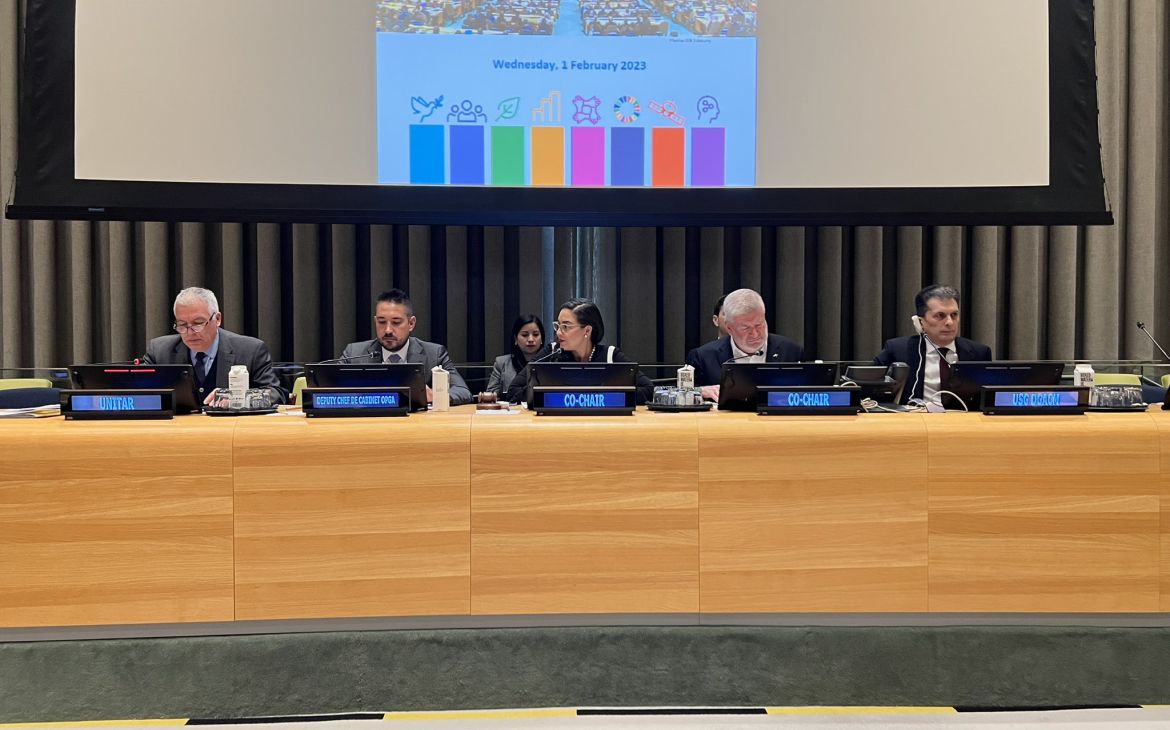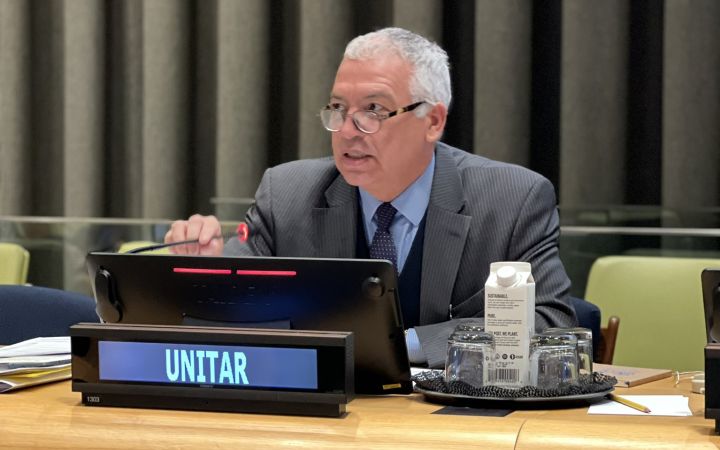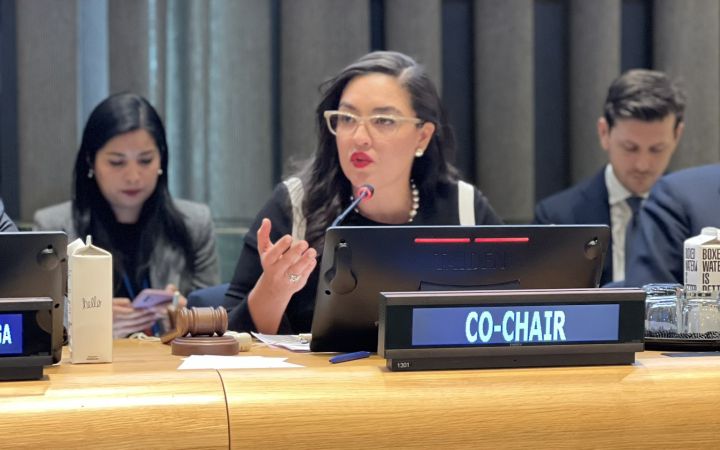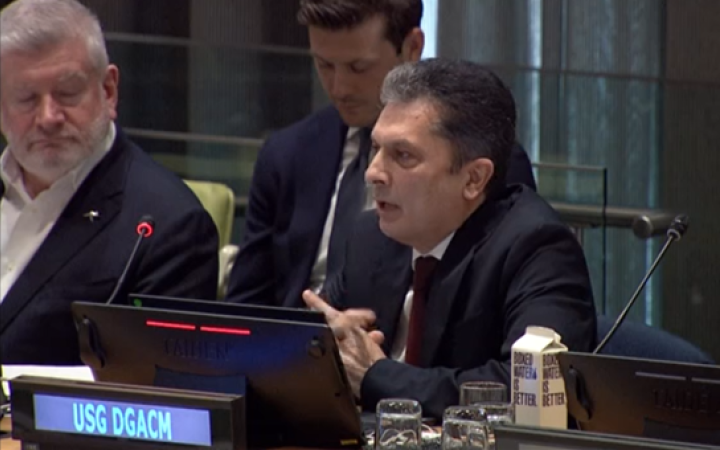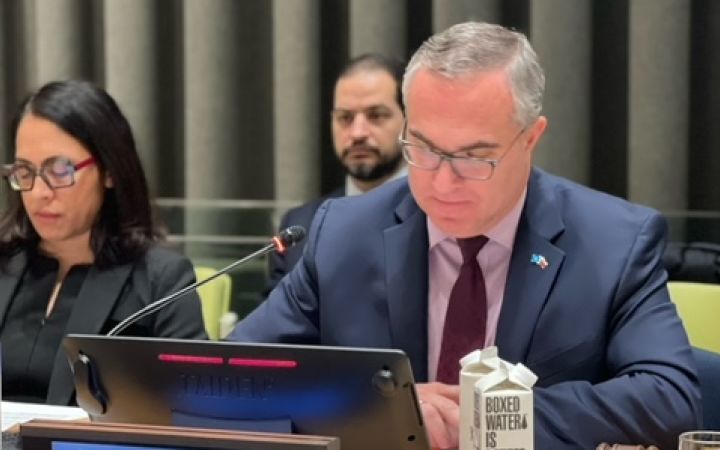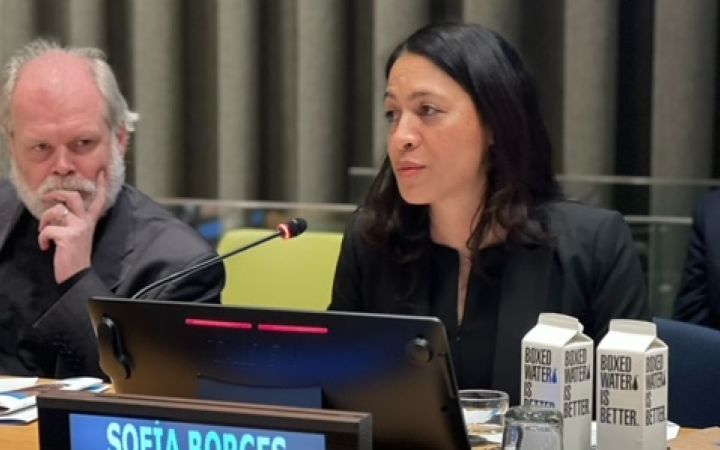1 February 2023, New York, USA.- United Nations delegates and experts participated in a tailored workshop entitled Revitalization of the Work of the General Assembly. Building upon past and ongoing experiences, all segments of the workshop aimed to enhance delegates’ capacity and essential knowledge of the background, mandate, main areas, and outcomes of the Ad Hoc Working Group (AHWG). Organized by the Permanent Missions of Australia and El Salvador and supported by the UNITAR New York office, the workshop counted nine presenters and more than 140 participants in an in-person setting at the United Nations.
The workshop was opened and moderated by the Head of UNITAR office in New York, Mr. Marco Suazo, who highlighted the main objective of the initiative. The workshop is to facilitate and understand the process and the work done by Member States which is also essential to help the Secretariat to implement ideas, and resolutions, and take the recommendations. Every single resolution Member State adopt is a mandate for the UN, he said. The audience was invited to engage transparently at the time the Secretary-General was quoted by the moderator “Member States’ efforts to revitalize the work of the General Assembly (GA) and streamline its resolutions, reporting requirements and committees have been welcomed.”, he added.
H.E. Ambassador Egriselda López, Permanent Representative of El Salvador, and H.E. Ambassador Mitch Fifield, Permanent Representative of Australia, both, as Co-Chairs of the Ad Hoc Working Group on the revitalization of the work of the General Assembly, were also invited as panellists who gave a broad spectrum of the background on the AHWG, including mandate, pillars, and key outcomes, as well as the overview of priorities for the upcoming AHWG session. The UN General Assembly holds a central position to revert the reality of having few female Presidents of the General Assembly and no one Secretary-General female, they both agreed.
Building on the work of previous co-chairs in the UN system, and supported by Member States, Ambassador Egriselda López from El Salvador aimed to guide the audience through the Revitalization of the work of the GA website. She explored the main site describing information from past and current sessions, and documents such as certain reports, resolutions, and other papers. In this framework, Ambassador López talked about a code of conduct for election campaigns from the Member States as well as how Member States can come together to ensure the convenience of other processes. During her intervention, she also talked and explained the functionalities of the e-delegates portal, a tool that helps the Secretariat to fulfil mandates. Back in the time having that tool was not that easy, she highlighted.
Concerns from Member States about the use of certain areas in the main building and other technological platforms to improve the work of the General Assembly were discussed during the workshop. Setting up many online platforms as possible and building its capacity to deliver better services will improve the work of the GA. Ambassador López cited the last resolution negotiated and its main outcomes as the urgent need to establish practices for general debates in the GA and the provision to the Member States of guidelines to not have an overwhelmed agenda during the high-level week in September, among other important reflections.
Ambassador Mitch Fifield from Australia highlighted the wide interest in the revitalization process, as well as perhaps a recognition that – for the process to succeed – Member States must play an active role in it. His remarks touched on priorities and key issues of focus for the current session of the Working Group. Those included:
- A recap of the proposals discussed during the 76th session pertaining to pillars one and two of the revitalization mandate: role and authority of the General Assembly; and working methods.
- A look ahead to the issues to be addressed during the 77th session, namely, pillars three and four of the mandate: strengthening the accountability, transparency, and institutional memory of the OPGA; and selection and appointment of the Secretary-General and other executive heads.
- An overview of those cross-cutting issues which span the breadth of the revitalization mandate.
The Deputy Chef de Cabinet, Mr Fernando Marani, spoke next in the programme on behalf of the President of the General Assembly H.E. Csaba Kőrösi, who underlined that the process of the revitalization of the GA needs “creative thinking and practical application”, he said. The concept note of the workshop states that the General Assembly has its working methods and revitalization has a big role. Mr Marani encouraged the audience to not underestimate the power Member States have to regularize the work of the GA.
From his point of view, the workshop on revitalization is a good example of better addressing the challenges of the UN and the GA itself. Technicalities of the work on revitalization discuss the need to make the start date of a regular session one week earlier than before, and the decision of the GA to biennials the revitalization resolution. We need to make an introspective analysis of how much biennialising resolutions will alleviate the work for a more effective GA, he emphasized.
Mr Movses Abelian, USG for General Assembly and Conference Management, was also present in the room as one of the main speakers and opened his intervention by expressing his sincere hope that this workshop and the forthcoming debates and negotiations would be fruitful and constructive. Mr Abelian expressed the services provided to Member States are efficient as they can be. The feedback received from Member States is historically part of a revitalization process, he said. On the other hand, he gave a few examples of special actions taken and all with interesting results as the journal (one product created back in 1946), the e-delegates platform, the idea of co-sponsorship resolutions online, uploading letters from the President of the General Assembly in the platform as part of the institutional memory of the UN. For Mr Abelian, without the current e-delegates platform, Member States cannot function properly. The USG continued its presentation focusing on the impact of the COVID-19 pandemic and the importance of information technology. The UN works based on data strategy and data is important for our work, he emphasized.
Panel Discussion Segment
Mr Marco Suazo, who led the workshop, open the panel discussion segment entitled “Exploring the revitalization process”. Guest invited to this segment consisted of H.E. Ambassador Michal Mlynár, Co-Chair of the AHWG at the 73rd to 75th sessions of the General Assembly, Ms Sofía Borges, Senior Vice President and Head of the New York Office of the United Nations Foundation, and Mr Richard Gowan, UN Director of the International Crisis Group, and Non-Resident Fellow of the Center of International Cooperation of the New York University.
The moderator invited the audience to engage with the panellists as they were presenting. As a former co-chair of the revitalization process during three sessions, H.E. Michal Mlynár is deeply familiar with the work of the Ad Hoc Working Group and helped steer a very successful resolution during the 75th session, which among other achievements, biennalised the revitalization process. He was asked, in his experience, why the revitalization process is important and what are the main challenges in achieving further progress.
The panel discussion was also an opportunity for Ms Sofia Borges, to give contributions from a civil society perspective. Her experience in the office of the President of the General Assembly, coming from a Member State (former Ambassador of Timor-Leste to the UN), tells her the participation of both -Member States and civil society- is imperative to understand limitations. The UN Charter states, “We the People”, and it hears the voices of everyone. The UN Foundation came with recommendations that were shared with the OPGA, and they included digitalization in UN meetings and processes, connectivity in all parts of the world, time difference and language barriers as limitations, and systematic engagements, among the most significant, she reflected. Ms Borges congratulated the PGA for having the Town Hall meeting, which is a fantastic opportunity for innovation.
Lastly, Mr Gowan was invited to identify further ways to enhance the role and authority of the General Assembly (it is one of the main mandates of the Ad Hoc Working Group). This includes reinforcing the coherence and complementarity between the agendas and work of the Main Organs of the United Nations, including the Security Council. Bearing in mind the roles and functions of the General Assembly and the Security Council on questions related to international peace and security, the moderator kindly asked him, from his point of view, how the coherence and complementarity between both organs can be strengthened and how the General Assembly can play a meaningful and complementary role in these issues.
To conclude the workshop, an interactive dialogue segment took place in which representatives from Mexico, the Philippines, Costa Rica, Dominican Republic, Ecuador, Spain, and Portugal took the floor to recognize the revitalization process of the GA as a constantly evolving and long-term process. The moderator thanked delegations for being analytical, creative, and innovative in addressing this topic.


